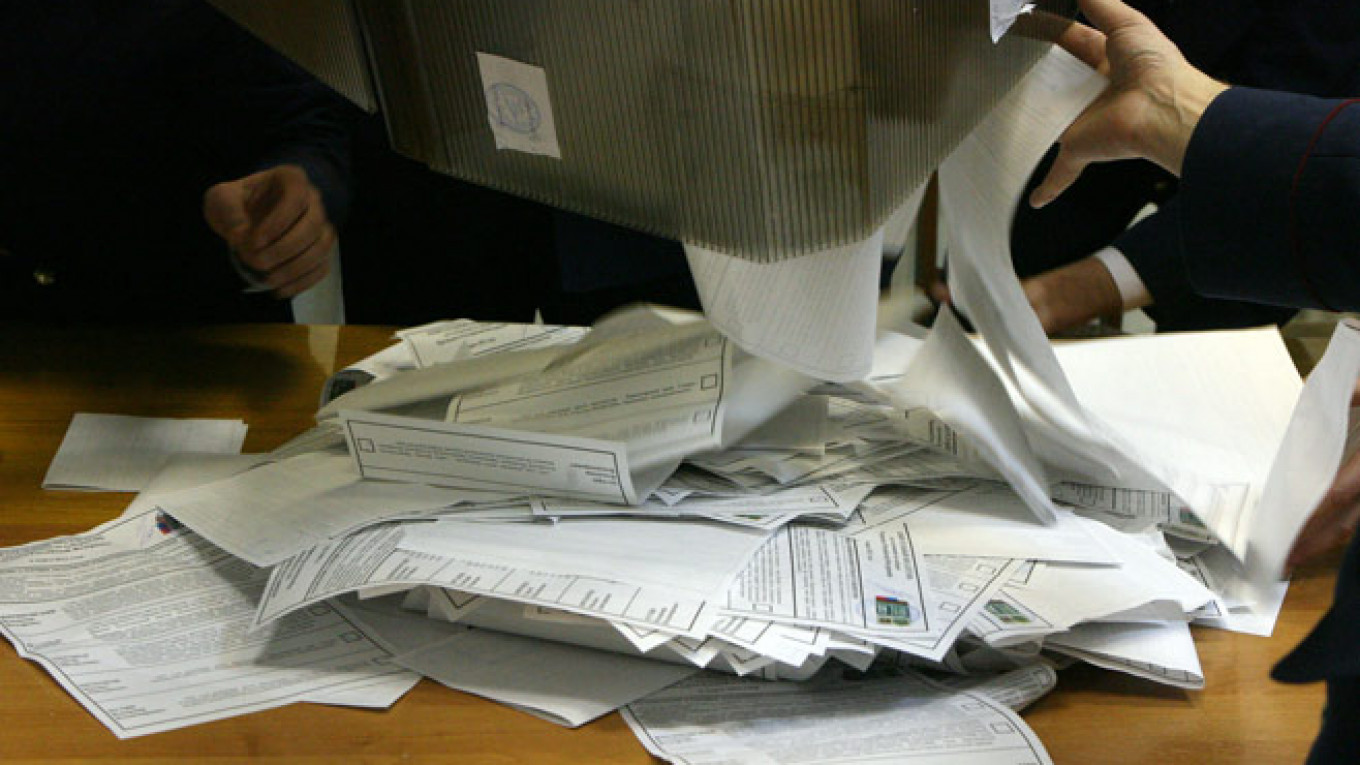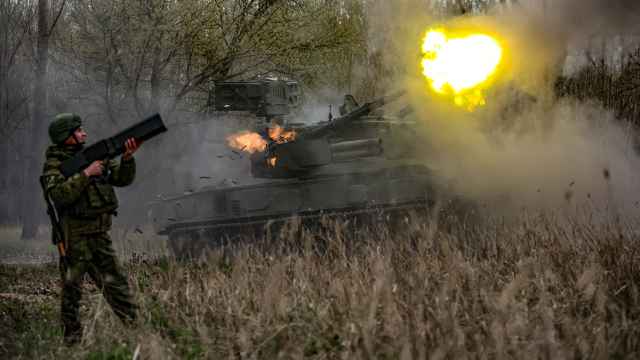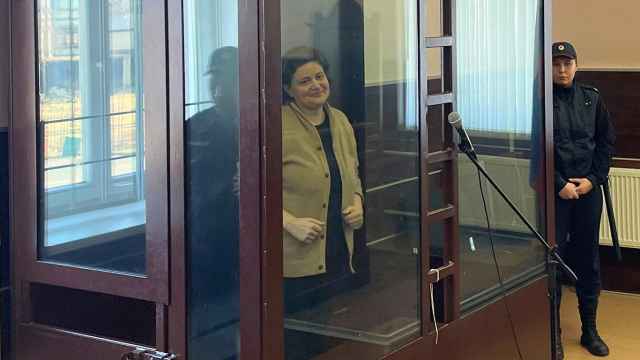Attempts by the opposition's Democratic Coalition to take part in upcoming regional elections have been thwarted by local election commissions' refusal to register its members as candidates, in what analysts say is a concerted effort to nip opposition bids in the bud.
The coalition, which consists of opposition firebrand Alexei Navalny's Party of Progress, Parnas and several other parties, put forward candidates for upcoming elections in the regional parliaments of Novosibirsk, Kostroma, Magadan and Kaluga.
In order to be registered as a candidate, campaigners are required to gather the signatures of potential voters in their support and submit them to the election commissions.
In the Novosibirsk, Kostroma and Magadan regions, the election commissions refused to register the candidates on the basis that too many of their signatures were invalid, while in Kaluga, the coalition decided not to submit the collected signatures at all, saying that pro-Kremlin activists had infiltrated their campaign and deliberately forged 30 percent of the signatures, rendering their bid invalid.
The so-called signature filter proved effective as a tool for pushing undesirable candidates out of the race in 2014, when several well-known opposition politicians — such as Maria Gaidar, who has since moved to Ukraine to work for Odessa Governor and ex-Georgian President Mikheil Saakashvili, and Olga Romanova, a prominent prisoners' rights advocate — were excluded from the race for the Moscow City Duma after election officials said that the numbers of valid signatures collected by the candidates were below the threshold.
Analysts say that election officials are blocking the opposition before the actual vote in an attempt to avoid situations such as the widespread falsifications during the 2011 State Duma elections that sparked large-scale protests in Moscow.
The mayoral elections of 2013 in which Moscow Mayor Sergei Sobyanin was almost forced into a second round of voting after Navalny ran against him and launched an intensive grassroots campaign, and opposition candidates such as anti-drug campaigner Yevgeny Roizman and psychologist Galina Shirshina won in Yekaterinburg and Petrozavodsk appear to have cemented officials' determination to nip future opposition bids in the bud.
Novosibirsk: Hunger Strike
Election officials in Novosibirsk said that the opposition had not collected enough signatures after weeks of canvassing and rallying voters by the opposition. Arguing that they had ensured that there was nothing wrong with the signatures they collected, several opposition activists declared a hunger strike after the commission's rejection.
"Of the 17,500 signatures, the … most exemplary ones were submitted to the election commission," Navalny wrote on his blog on July 17. "There is no legal reason to deny us the opportunity to participate in the elections," he said.
His longtime ally Leonid Volkov, a former Yekaterinburg municipal lawmaker who runs the coalition's campaign in Novosibirsk, explained that most signatures proclaimed invalid by the election commission reportedly failed to correspond to the database of the regional branch of the Federal Migration Service (FMS).
This database, Volkov said, was outdated and full of errors, but the authorities rejected all the explanations and evidence, claiming there was "no reason not to believe the FMS."
"We showed her [the FMS official] everything. … We said: 'If you have information in your database that a person still owns a passport issued by the U.S.S.R., for example, and we have a more recent passport number in our signature list, isn't it your [FMS] error and not ours?' But she answered 'No, the FMS data is up to date and correct," Volkov wrote in his blog.
The coalition filed a complaint along with what they say is proof of their signatures' validity to the Central Election Commission in Moscow, which predictably decided against them on Friday.
Navalny, who attended the hearing, said the coalition didn't agree with the decision and would continue to fight for its right to be registered, his spokeswoman Kira Yarmysh wrote on Twitter.
Volkov announced via Twitter a rally for supporters scheduled to take place Tuesday. On Saturday he and his allies decided to end their hunger strike after one of the rejected candidates, Sergei Boiko, ended up in the intensive care unit of a local hospital, and Navalny called on his comrades to end the strike and look after their health.
Being denied registration is not the only trouble Navalny's allies have had to deal with in Novosibirsk. The local branch of the Investigative Committee has launched a case against the campaigners, accusing them of not paying one of the signature collectors.
According to Volkov, that collector was a pro-Kremlin mole who infiltrated their campaign in order to forge signatures and in doing so frame the coalition.
Magadan: Out for Revenge
Twenty-five out of 614 signatures in support of Georgy Alburov — an employee of Navalny's Anti-Corruption Foundation and a candidate for the Magadan regional Duma — and two other potential candidates were also deemed invalid last month, leaving the coalition with an insufficient number of signatures to be registered for the election.
According to Alburov, the local election commission's graphologist found that 19 of them had been forged by signature collectors.
"Five of them were gathered by Vadim Syromyatnikov, our [candidate] number two, four of them I gathered myself, two of them were gathered by our campaign head Dmitry Krainev and one by local civil rights advocate and [candidate] number three [in our list] Zoya Leukhina," which means they can't be forged, Alburov wrote in his blog on July 31.
Another signature that was declared a forgery was provided by a local resident who signed the list in front of TV cameras, Alburov wrote.
"All other [measures to keep the opposition out of the race], such as fabricated criminal cases, censorship and lies on TV, attacks on campaign workers [that took place in late June], are no longer enough," Navalny wrote on his blog last week.
Campaigners in Magadan have also filed a complaint with the Central Election Commission and plan to take their case to court if necessary, Alburov said, adding that in the meantime, opposition activists plan to launch a campaign against local deputies from the ruling United Russia party.
"Every Magadan resident will know that the regional Duma consists of illegitimate hellish crooks who bought their mandates, and the attempts to elect at least one honest deputy there were undercut," Alburov wrote in his blog last week. "Life doesn't end with these elections," he added.
Kostroma and Kaluga: Infiltration
Ilya Yashin, an ally of slain opposition politician Boris Nemtsov and one of three candidates of the coalition in Kostroma, announced last week on his Facebook page that the local election committee had used the same tactics as in Novosibirsk and Magadan.
On Saturday, the regional election commission ruled to throw opposition candidates out of the race. Commission members rejected the coalition's arguments for the validity of rejected signatures, Volkov wrote on Twitter.
The Kostroma campaign head, Andrei Pivovarov, was arrested in late July and accused of attempting to steal personal data. According to Yashin, Pivovarov was set up by a police officer who allegedly gave the activist access to a police database and was subsequently arrested as his accomplice.
In Kaluga, the Democratic Coalition has for the first time given up on the idea of running the race on a party ticket.
Coalition member Vladimir Milov told Kommersant daily last month that the campaign had collected 6,300 signatures. Only 4,000 were needed to register the candidates, but 2,500 signatures turned out to have been forged by pro-Kremlin activists who infiltrated the campaign, leaving the coalition 200 signatures shy.
Nevertheless, Navalny and his allies refused to quit and said they would continue to support several candidates from single-member constituencies in the region.
The Easiest Way
The desire to bar opposition candidates from elections at the registration stage is easily explainable, according to Dmitry Oreshkin, an independent political analyst and head of the Mercator political research group.
"The Kremlin fears elections at all levels," he told The Moscow Times, commenting on the situation in Novosibirsk. "And the resources of [Vladimir] Churov [chair of the Central Election Commission who is accused by critics of manipulating election results for the ruling party] are not unlimited," Oreshkin said.
After the State Duma elections in 2011, the authorities made the decision to minimize ballot fraud during major elections, as it generates a major media backlash, so now they prefer to use another technique to get rid of the opposition: cutting it off at the registration stage, said Andrei Buzin, co-chair of the council of Golos, an independent election-monitoring watchdog.
In 2013 Navalny was allowed to participate in the mayoral election, but the authorities did not like the outcome — Navalny got more than 27 percent of the vote — at all, and will therefore keep the opposition out this year at all costs, Buzin said.
"It's quite difficult to falsify the results of a vote, and it constitutes a crime. To deny registration [on the basis of an insufficient number of signatures] is the easiest way," he told The Moscow Times on Friday in a phone interview.
According to Buzin, as long as the FMS database is used as evidence of the invalidity of the signatures, the Democratic Coalition has no chance of overturning the election commission's ruling.
"If they admit that the FMS references are incorrect, they will have to admit that they turned down a lot of candidates illegitimately, because they have used it so many times," he said.
Contact the author at d.litvinova@imedia.ru
A Message from The Moscow Times:
Dear readers,
We are facing unprecedented challenges. Russia's Prosecutor General's Office has designated The Moscow Times as an "undesirable" organization, criminalizing our work and putting our staff at risk of prosecution. This follows our earlier unjust labeling as a "foreign agent."
These actions are direct attempts to silence independent journalism in Russia. The authorities claim our work "discredits the decisions of the Russian leadership." We see things differently: we strive to provide accurate, unbiased reporting on Russia.
We, the journalists of The Moscow Times, refuse to be silenced. But to continue our work, we need your help.
Your support, no matter how small, makes a world of difference. If you can, please support us monthly starting from just $2. It's quick to set up, and every contribution makes a significant impact.
By supporting The Moscow Times, you're defending open, independent journalism in the face of repression. Thank you for standing with us.
Remind me later.






